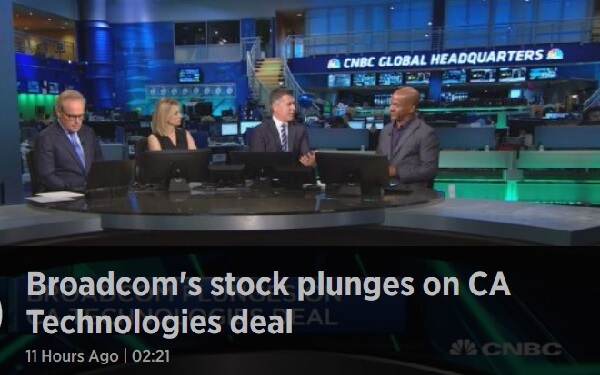
Tenet Fintech Group Inc. (CSE: PKK, OTC Pink: PKKFF)
Commercial Lending in China Ready to Tenet!

The semiconductor company that tried and failed to buy Qualcomm has a new strategy — become a serial infrastructure software acquirer.
Broadcom, which announced on Wednesday that it’s buying CA for almost $19 billion, is turning away from rolling up semiconductor companies and toward buying up mainframe and infrastructure software companies. Broadcom plans to use CA as a new software platform to buy and merge other, similar software companies, according to people familiar with the matter.
Broadcom CEO Hock Tan views infrastructure software companies as similar to the hyper-fragmented semiconductor industry from about seven years ago, one of the people said. That makes software ripe for acquisitions and follow-on cost cutting — Tan’s specialty.
One possible candidate could eventually be BMC, which sells software to help companies manage their IT operations. BMC was reportedly in talks to merge with CA last year, then was scooped up by private equity group KKR earlier this year for a price reported at $8.3 billion.
The CA deal for Broadcom “represents an important building block as we create one of the world’s leading infrastructure technology companies,” Tan said in a statement.
As CEO of Avago, Tan made a series of acquisitions, including a $6.6 billion deal for LSI Corp. and a $37 billion merger with Broadcom, the largest pure technology transaction ever at the time. That deal changed Avago’s name to Broadcom, which then went on to buy Brocade for $5.5 billion in 2016. Tan then gained international headlines for his $103 billion hostile takeover offer for Qualcomm, which ultimately failed after the U.S. government blocked the deal.
Back in 2013, Avago traded around $37 a share. Since then, shares have risen more than 460 percent to about $210 per share.
The bet now is that Tan can use his acquisition integration acumen to derive value from a business vertical that isn’t core to Broadcom’s semiconductor business. Investors either didn’t understand the strategy or showed a heavy degree of skepticism today, driving Broadcom shares down about 14 percent.
Starting a new platform vertical for future acquisitions is a private equity model — and it’s the reason why Silver Lake managing partner Ken Hao announced on Thursday that he’s stepping down from Broadcom’s board. Hao helped hire Tan for Avago in 2006 and worked closely with him during Broadcom’s hostile pursuit of Qualcomm. He’s been an influential part of Broadcom’s deal decision making for years.
Hao wasn’t comfortable with Broadcom’s CA acquisition and recused himself instead of voting for the deal, according to people familiar with the matter. Broadcom said in a filing today that Hao resigned from the board “to proactively avoid any potential conflicts of interest that could arise from his role as a director of Broadcom following its proposed acquisition of CA.”
Silver Lake already owns a variety of enterprise software assets, such as Dell and SolarWinds. But Hao resigned from Broadcom’s board because the chipmaker is now going to be hunting for enterprise software companies that Silver Lake may also want to buy, the people said.
Tan has a strong track record with acquisitions, but he could probably use someone that knows the enterprise software world as he constructs his next round of deals. You know, someone like Ken Hao.
Source: CNBC